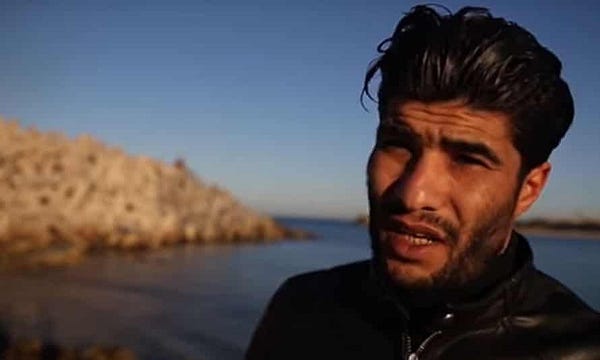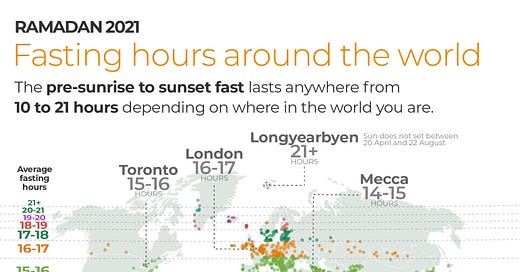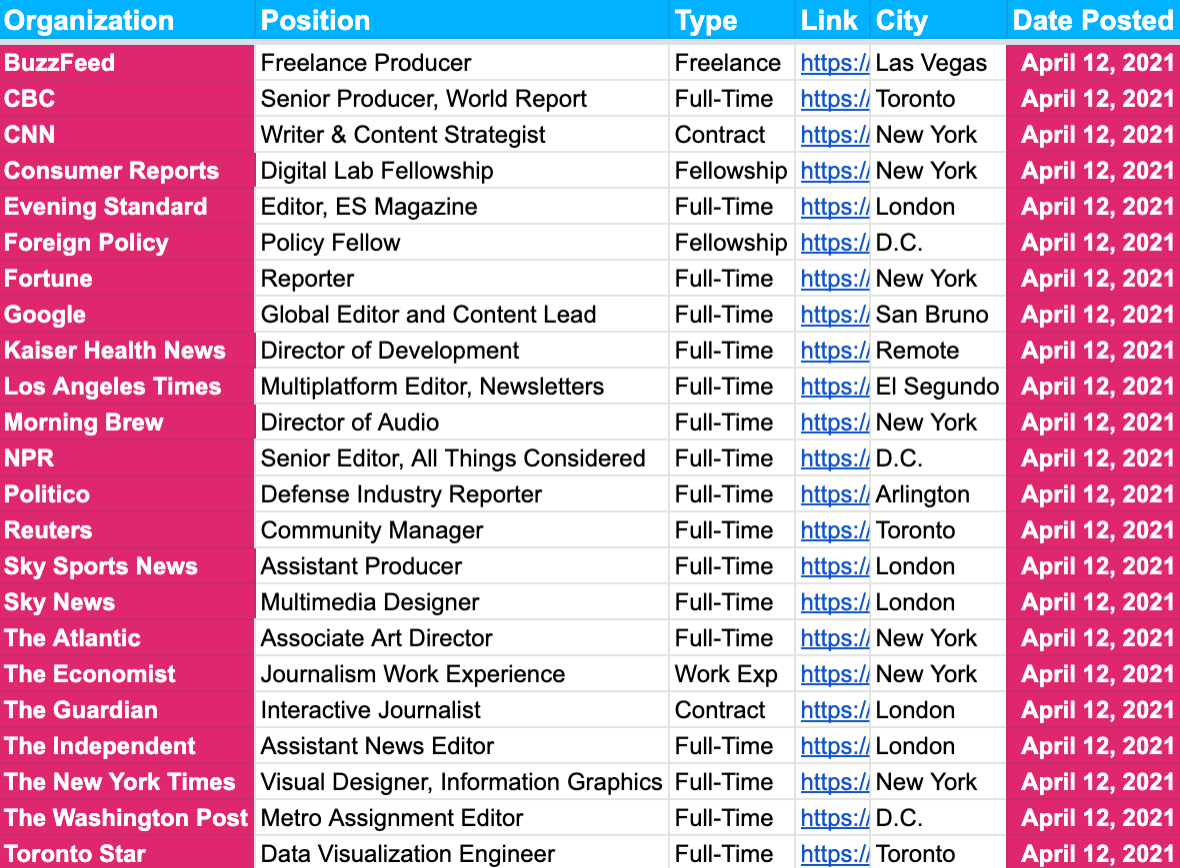🌍 Inside The Middle East — April 15
Biden to Withdraw U.S. Troops by Sept. 11, No Proof Princess Latifa is Alive, Lebanon Expands Maritime Claim With Israel, Libya Releases One of World’s Most Wanted, Ramadan Begins
Happy Thursday folks! Hope we’re all sound and well. Lots to get through today, so we’ll get straight to it!
I’m thrilled to announce Inside The Newsroom has been featured as one of the Top Places to Find Photography Jobs by our friends at PhotoShelter and feature shoot, and you can find a cheeky discount link to the job board by downloading the guide below… 👇
Also be sure to check out Monday’s job board update and Picks of the Week including 450 new jobs and the news of violent unrest in Northern Ireland.
And lastly, a quick update to the Iran-U.S. nuclear talks taking place in Austria that made it into a second week, a sign of progress and hope that both countries can rejoin the 2015 nuclear accord. But a dark shadow hangs over the talks after an attack on a key Iranian nuclear site last week, where an explosion cut off all electricity at the plant. Iran has blamed Israel and vowed revenge in due course.
Okay, jobs and data below, let’s get to the rest of the news!
Job Corner ✍️
A whopping 450 new jobs and internships were added to the board over the weekend, including at CNN, Consumer Reports, Evening Standard, Foreign Policy, Google, Los Angeles Times, Morning Brew, Sky Sports News, The Economist, The Guardian, The New York Times, The Washington Post and Toronto Star… 👇
If you’re a paying member, your jobs sheet link will remain the same. Interested in a free week’s trial? Reply to this email and we’ll hook you up!
Data Corner 🧮
A few datasets referenced in today’s edition…
Maritime Borders: Shapefiles for global exclusive economic zones, from marineregions.org
Cost of Afghan War: Annual cost of U.S. war in Afghanistan, from the U.S. Department of Defense
Afghan Reconstruction: Stack load of reports and data on the reconstruction of Afghanistan, from SIGAR
Civilian Casualties: Annual and quarterly reports with data on civilian casualties, from UNAMA
Human Trafficking: Comprehensive dataset on global trafficking, from the Counter Trafficking Data Collaborative
Lebanon Expands Maritime Claim With Israel
We begin this week in Lebanon with an update to its maritime border claims with Israel from October, when the latter agreed to talks about the countries’ territories. A peaceful resolution has the potential of generating lucrative oil and gas deals for both sides, but the negotiations could now get ugly after Lebanon added about 540 square miles to its original exclusive economic zone (EEZ) submission to the UN.
The Eastern Mediterranean is one of the most sought-after drilling regions in the world, for its rich oil and gas reserves, and its waters are already being disputed by the likes of Turkey, Greece, Cyprus, Libya, Syria and Egypt. Perhaps a precursor of what’s to come, Lebanon’s Minister of Transport said he expects the new proposal will be signed by everyone it needs to be on the Lebanese side, and “We will not give up any inch of our homeland or a drop of its waters or an inch of its dignity”. To be continued…

No Proof Princess Latifa is Alive
We move to the U.A.E. next who the UN claims has failed to show proof that Princess Latifa is alive, two months after she leaked videos of herself allegedly being held captive by her own father and prime minister of the U.A.E., Sheikh Mohammed al-Maktoum. Dubai’s royal family said in a statement at the time that Latifa was "being cared for at home," but after several unanswered requests for “proof of life”, concerns are growing that Latifa isn’t alive at all.
Sheikh Mohammed also faces pressure to answer questions of the whereabouts of another of his daughters, Shamsa, who Latifa alleged in a letter to the UK government was kidnapped from the streets of England in 2000, and was “enslaved and oppressed.”
“We are very concerned about both cases, because we don't know what is happening,” UN spokeswoman Marta Hurtado said. “That's why we are not only asking where they are, but we want to meet them. We want to speak with them. We want to understand what is their situation.”
Meanwhile, U.S. President Joe Biden will proceed with the sale to the U.A.E. of more than $23 billion (£16.7 billion) worth of arms sales, agreed under former president Donald Trump.
Video: What has happened to Princess Latifa?
Last Time on Inside The Middle East…
🌍 Inside The Middle East — April 8
🌍 Inside The Middle East — April 1
🌍 Inside The Middle East — March 25
🇸🇾 10 Years of Syrian Civil War — March 18
Biden to Withdraw Troops from Afghanistan by September 11
Staying with the U.S., Biden announced yesterday that he’ll withdraw all 2,500 remaining U.S. troops from Afghanistan by the 20th anniversary of the September 11 terrorist attacks. A further 7,000 foreign troops serving under Nato’s coalition are also likely to withdraw in tandem with the U.S. A senior administration official said “We judge the threat against the homeland now emanating from Afghanistan to be at a level that we can address it, without a persistent military footprint in the country and without remaining at war with the Taliban.”
After almost 20 years of war with the Taliban, the success of America’s presence in Afghanistan is a lot harder to define than the U.S. government will let on. In reality, the troop withdrawal has more to do with domestic political pressure instead of the realization of any strategic objectives in the longest war in U.S. history. The Taliban has slowly regained strength over the past decade and now controls more territory than at any point since the U.S.-led invasion.
Not mentioned enough are the roughly 800,000 U.S. military personnel that have served at least one tour of Afghanistan since 2001, including the 2,300 that have been killed and 20,000 wounded. And that’s not to mention the nearly 50,000 Afghan civilians that have died. Meanwhile, peace talks between the Taliban and Afghan government will resume in Turkey next week.
Chart: Number of Afghan civilians killed and injured in armed conflict

Libya Releases One of World’s Most Wanted
We visit Libya next where authorities have released a man known as one of the world’s most wanted human traffickers, suspected of deliberately sinking migrant boats trying to make it to Europe. The coastguard commander, known by his alias Bija, was originally arrested in October, but was released by the country’s military attorney general for a lack of evidence, despite being under UN sanctions, and the subject of an investigation by Italian newspaper Avvenire that directly linked Bija to criminal activity. The decision has not gone down well outside of Libya.


Start of Ramadan Celebrated Around the World
We end this week with a nod to those around the world celebrating the start of Ramadan, the month-long Muslim festival that involves going without food and water during hours of daylight. Ramadan represents the ‘fasting’ pillar of Islam — the others include faith, prayer, almsgiving and pilgrimage — and is considered to be an act of worship enabling Muslims to feel closer to Allah. Because Muslims follow the Hijri calendar, each year Ramadan begins 10 to 12 days earlier.

Which country you live in will determine how tough a task you have. Those living in the southernmost countries such as Chile or New Zealand will have to fast for around 11 hours, while those living in northern countries like Iceland and Norway will have to last an average of about 18 hours a day. Good luck to everyone!

That’s all for today, see you tomorrow for Picks of the Week! 👋




